Paignton House on Lake Rosseau Brochure Port Carling Muskoka Canada 1960
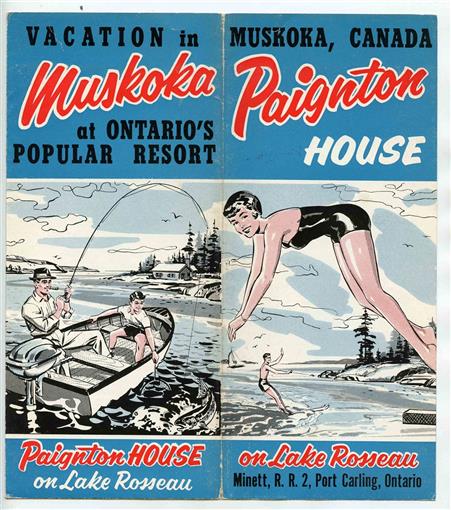
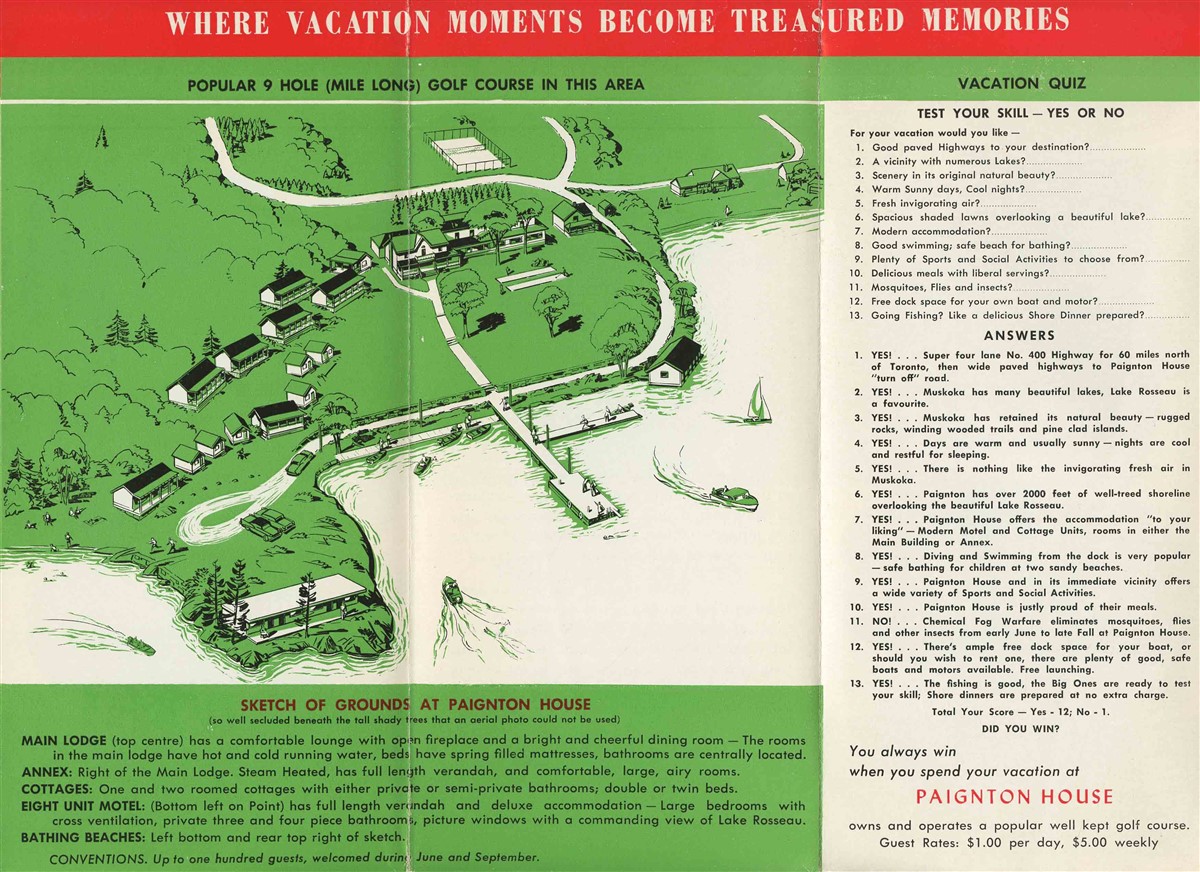
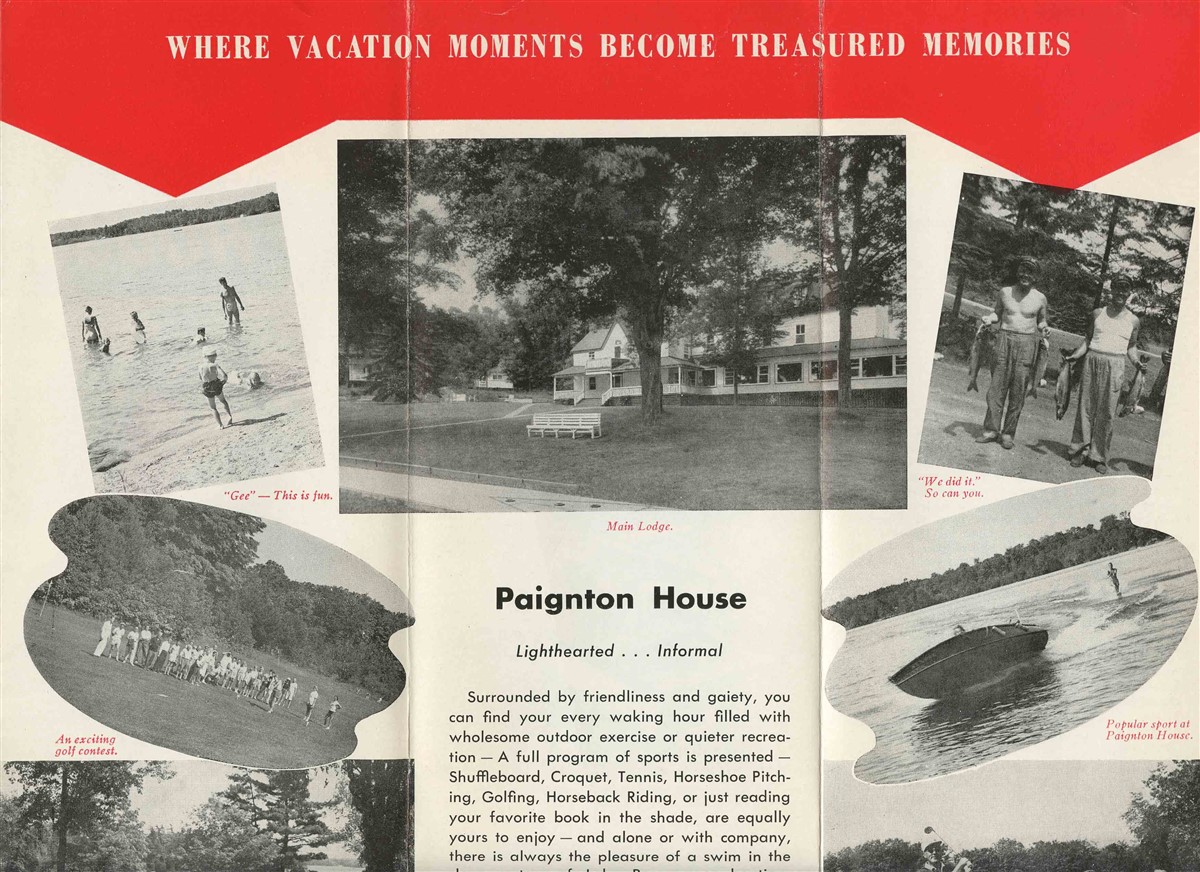
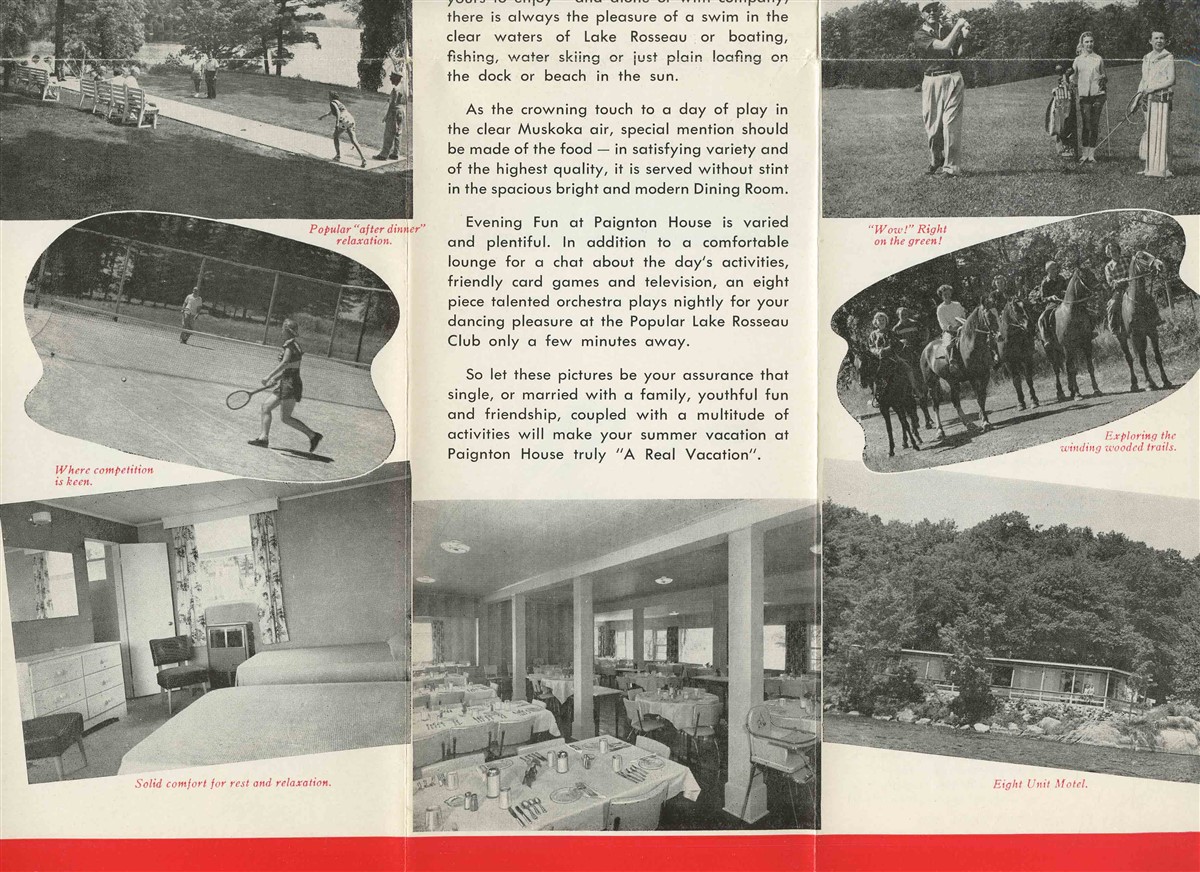
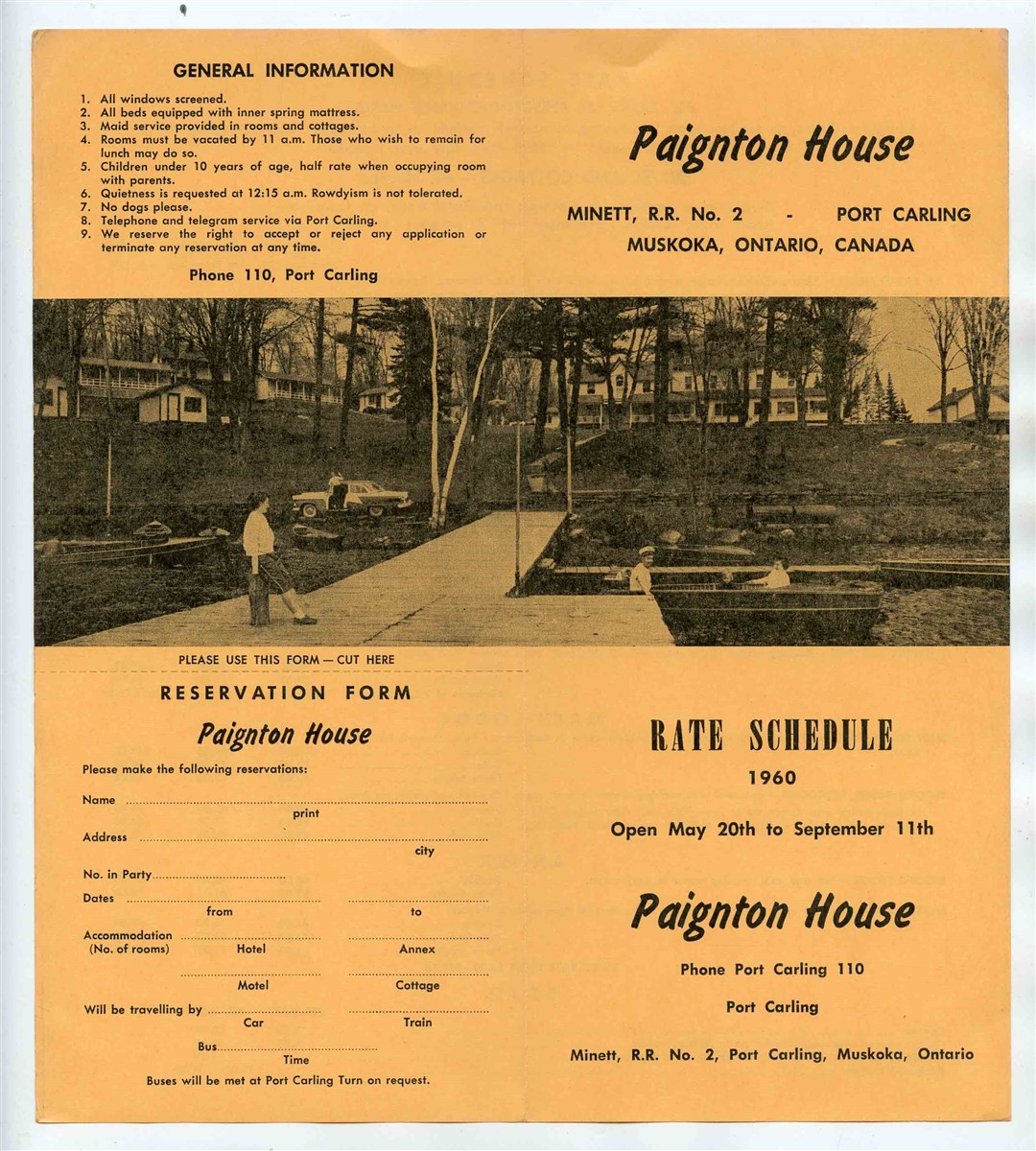
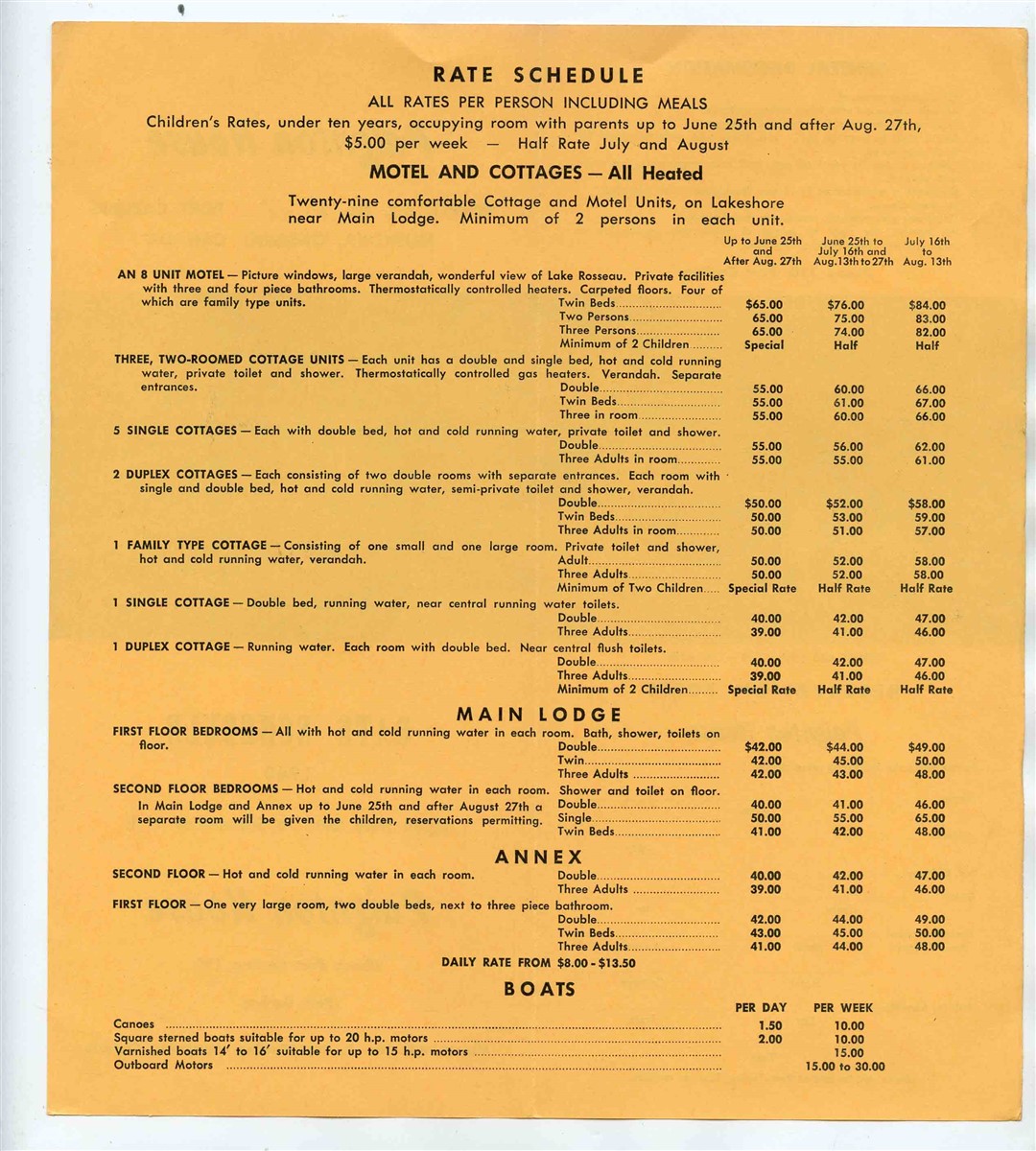
There are 2 items in this lot. A 12 panel fold out with Sketch of the Grounds , vacation quiz with answers, hotel photos and information , area map and more on the Paignton House on Lake Rosseau in Port Carling Muskoka Canada. Plus a 4 panel rate schedule for 1960 with photo, general information and reservation form
Andrew Hind Huntsville Forester Wednesday, May 16, 2018
Muskoka’s Paignton House was nestled in a beautiful, quiet bay on Lake Rosseau. Throughout the summer, for decades, families would rise early to fuel up on breads baked fresh and eggs harvested from the on-site farm. Then it was time swim in the placid waters, enjoy boating excursions out on the lake, ride horses through shaded woods, or while away the afternoon on a comfortable chair. In the evening, as the sky deepened to a dark blue, families would gather to trade tales of the day’s exploits and begin anticipating the day to come. This was the daily cycle of things at Paignton House, among Muskoka’s most beloved family-oriented resorts. It survived almost a century of change and upheaval by making guests two simple promises: that a new adventure would await every day and that they would receive the warmest of hospitality, the kind that can only be offered when a family invites another into their home. When John Frederick Pain opened Paignton House, he did far more than just build a hotel. He also laid the foundation for a family legacy that would see four successive generations invest their heart and soul in the resort. “Family Run for Family Fun” wasn’t merely a clever advertising slogan they came up with, but rather a guiding principle the Pain family lived by. It was a guiding principle that worked and saw Paignton House thrive even as numerous contemporaries faltered, or even closed. Pain was born in Calcutta, India in 1845. Pain’s father was a wealthy English merchant who made a small fortune trading between Asia and Europe. J.F contracted malaria while growing up in India and suffered from its lingering effects throughout his life. In fact, it’s been suggested that the chronic effects of the illness were directly responsible for his arrival in Muskoka. His parents, so the story goes, listened to the advice of a physician and shipped their 21-year-old son to Canada in 1866 in the belief that Muskoka’s fresh air and invigorating climate would restore his fragile constitution. In 1869, J. F. Pain settled along a sheltered bay on northwestern Lake Rosseau. It was a magnificent parcel of land worthy of his privileged background, with a sandy beach and spectacular views. Things were tough, though, especially for a man with a poor constitution and who had little experience in manual labour. Pain’s one great success in these early years was his marriage to Charlotte Tuck, a young woman unafraid of hard work and a wealth of practical experience. According to his descendants, J.F. wasn’t really the working type. “He was a gentleman who always wore a vest and tie. His wife milked the cows and did the work,” recalled grandson Archie Pain. In between doing her household chores and rearing three kids – Fred, Nell, and Richard Dickinson (‘Dick’) – she found the time and energy to ensure that the farm provided enough for the family to eat. Her workload only increased when the Pains, inspired by the success of nearby Clevelands House, decided to enter the hospitality industry. Throughout 1894, the Pain home underwent renovation that saw it expanded into a small resort capable of accommodating 50 guests at a time. J.F. named it Paignton House, after the English town where he had spent part of his youth. With the demand for summer accommodations so great Paignton House had little trouble attracting guests and it soon developed an enviable reputation. Once again, much of the credit must go to Charlotte. While J.F. was the face of the hotel, a sociable fellow who spent much of his days entertaining guests, his wife quietly worked behind the scenes to make sure everything functioned smoothly. Over the decades that followed, the resort grew in size and reputation, but in 1918 a tiring J.F. and Charlotte decided to retire and pass the torch to their son, Dick. In many ways, Dick was the polar opposite of his father. Whereas the elder Pain shunned hard work, Dick was unafraid of manual labour and actually seemed to revel in it. In that regard, he was more like his mother. Dick needed to be tireless. Guests had largely stayed away from Muskoka’s resorts during the previous four years as World War One raged in Europe and carefree summer vacations suddenly didn’t seem so important. It fell to Dick to put Paignton House on the map once more. Dick, assisted by his wife, Marie, was determined to restore Paignton House to its pre-war success, if not surpass it. It would be a huge job and costly, but they were young and energetic. Headlines newsletter Top stories delivered to your inbox. Sign Up Dick began by adding another storey to the lodge so that Paignton House could comfortably handle 100 guests, and adding amenities in the form of tennis courts and a lawn-bowling green. Having seen the lean years of World War One, Dick sensibly lavished attention on the family farm as well. More acreage was put under cultivation and the number of livestock increased. This meant that the resort was almost entirely self-sufficient in terms of foodstuffs. While his energy seemed to be boundless, every man has his limits so Dick was blessed to have three sons – John, Robert, and Archie – to help around the resort and farm. “I had to go and milk the cows ... sometimes I’d have to find them first. They could be two miles away,” Archie recounted late in his life. The three boys also carried trunks up to guest rooms, cut firewood (the resort burned 30 cords of split wood in the cookstove each summer), and maintained the grounds. One of their favourite jobs was piloting the resort’s 36-foot boat, the Minerva, to the Royal Muskoka Hotel so that guests could enjoy a night of dancing to music performed by legends of the Big Band era. Dick was remarkably successful as a hotelier. He restored the resort’s fortunes, and guided it through the troubled times of the Depression and Second World War, so by 1954 there seemed no challenge remained for the 59-year-old. He realized it was time to move on and agreed to sell Paignton House to his sons, Archie and Robert. It was around this time that the resort shifted its focus again, now catering largely towards family groups looking for summer vacations suitable for children and adults alike. With family’s firmly in mind, Paignton House boasted one of the more developed children’s program of any resort in Muskoka. Parents would drop their kids off at 9:30 a.m., pick them up for lunch, and then leave them once again until 7 p.m. Children loved their time at the resort, joyful days filled with arts and crafts, swimming, hikes, games, and a full day at Santa’s Village in Bracebridge. OCAL NEWS Muskoka’s Paignton House: ‘Family Run for Family Fun’ Paignton House survived almost a century of change and upheaval by making guests two simple promises Andrew Hind Huntsville Forester Wednesday, May 16, 2018 Muskoka’s Paignton House was nestled in a beautiful, quiet bay on Lake Rosseau. Throughout the summer, for decades, families would rise early to fuel up on breads baked fresh and eggs harvested from the on-site farm. Then it was time swim in the placid waters, enjoy boating excursions out on the lake, ride horses through shaded woods, or while away the afternoon on a comfortable chair. In the evening, as the sky deepened to a dark blue, families would gather to trade tales of the day’s exploits and begin anticipating the day to come. This was the daily cycle of things at Paignton House, among Muskoka’s most beloved family-oriented resorts. It survived almost a century of change and upheaval by making guests two simple promises: that a new adventure would await every day and that they would receive the warmest of hospitality, the kind that can only be offered when a family invites another into their home. When John Frederick Pain opened Paignton House, he did far more than just build a hotel. He also laid the foundation for a family legacy that would see four successive generations invest their heart and soul in the resort. “Family Run for Family Fun” wasn’t merely a clever advertising slogan they came up with, but rather a guiding principle the Pain family lived by. It was a guiding principle that worked and saw Paignton House thrive even as numerous contemporaries faltered, or even closed. Pain was born in Calcutta, India in 1845. Pain’s father was a wealthy English merchant who made a small fortune trading between Asia and Europe. J.F contracted malaria while growing up in India and suffered from its lingering effects throughout his life. In fact, it’s been suggested that the chronic effects of the illness were directly responsible for his arrival in Muskoka. His parents, so the story goes, listened to the advice of a physician and shipped their 21-year-old son to Canada in 1866 in the belief that Muskoka’s fresh air and invigorating climate would restore his fragile constitution. In 1869, J. F. Pain settled along a sheltered bay on northwestern Lake Rosseau. It was a magnificent parcel of land worthy of his privileged background, with a sandy beach and spectacular views. Things were tough, though, especially for a man with a poor constitution and who had little experience in manual labour. Pain’s one great success in these early years was his marriage to Charlotte Tuck, a young woman unafraid of hard work and a wealth of practical experience. According to his descendants, J.F. wasn’t really the working type. “He was a gentleman who always wore a vest and tie. His wife milked the cows and did the work,” recalled grandson Archie Pain. In between doing her household chores and rearing three kids – Fred, Nell, and Richard Dickinson (‘Dick’) – she found the time and energy to ensure that the farm provided enough for the family to eat. Her workload only increased when the Pains, inspired by the success of nearby Clevelands House, decided to enter the hospitality industry. Throughout 1894, the Pain home underwent renovation that saw it expanded into a small resort capable of accommodating 50 guests at a time. J.F. named it Paignton House, after the English town where he had spent part of his youth. With the demand for summer accommodations so great Paignton House had little trouble attracting guests and it soon developed an enviable reputation. Once again, much of the credit must go to Charlotte. While J.F. was the face of the hotel, a sociable fellow who spent much of his days entertaining guests, his wife quietly worked behind the scenes to make sure everything functioned smoothly. Over the decades that followed, the resort grew in size and reputation, but in 1918 a tiring J.F. and Charlotte decided to retire and pass the torch to their son, Dick. In many ways, Dick was the polar opposite of his father. Whereas the elder Pain shunned hard work, Dick was unafraid of manual labour and actually seemed to revel in it. In that regard, he was more like his mother. Dick needed to be tireless. Guests had largely stayed away from Muskoka’s resorts during the previous four years as World War One raged in Europe and carefree summer vacations suddenly didn’t seem so important. It fell to Dick to put Paignton House on the map once more. Dick, assisted by his wife, Marie, was determined to restore Paignton House to its pre-war success, if not surpass it. It would be a huge job and costly, but they were young and energetic. Headlines newsletter Top stories delivered to your inbox. Sign Up Dick began by adding another storey to the lodge so that Paignton House could comfortably handle 100 guests, and adding amenities in the form of tennis courts and a lawn-bowling green. Having seen the lean years of World War One, Dick sensibly lavished attention on the family farm as well. More acreage was put under cultivation and the number of livestock increased. This meant that the resort was almost entirely self-sufficient in terms of foodstuffs. While his energy seemed to be boundless, every man has his limits so Dick was blessed to have three sons – John, Robert, and Archie – to help around the resort and farm. “I had to go and milk the cows ... sometimes I’d have to find them first. They could be two miles away,” Archie recounted late in his life. The three boys also carried trunks up to guest rooms, cut firewood (the resort burned 30 cords of split wood in the cookstove each summer), and maintained the grounds. One of their favourite jobs was piloting the resort’s 36-foot boat, the Minerva, to the Royal Muskoka Hotel so that guests could enjoy a night of dancing to music performed by legends of the Big Band era. Dick was remarkably successful as a hotelier. He restored the resort’s fortunes, and guided it through the troubled times of the Depression and Second World War, so by 1954 there seemed no challenge remained for the 59-year-old. He realized it was time to move on and agreed to sell Paignton House to his sons, Archie and Robert. It was around this time that the resort shifted its focus again, now catering largely towards family groups looking for summer vacations suitable for children and adults alike. With family’s firmly in mind, Paignton House boasted one of the more developed children’s program of any resort in Muskoka. Parents would drop their kids off at 9:30 a.m., pick them up for lunch, and then leave them once again until 7 p.m. Children loved their time at the resort, joyful days filled with arts and crafts, swimming, hikes, games, and a full day at Santa’s Village in Bracebridge. Adults had their own share of exciting activities to occupy their days, including swimming, canoeing, boating, shuffleboard, tennis, golf, horseback riding, and scenic cruises aboard the Lady Elgin. In the evenings, guests would enjoy campfires, sing-alongs, dancing in the Hyde-a-Way Lounge and live entertainment. There was something for everyone, and never a dull moment. While Archie and Robert were equal partners, it was Archie and Betty, and their five children – Susan, Peggy, Ann-Marie, Janet, and Doug – who lived on premises and ran the resort. Archie handled all the maintenance and renovations himself, even building a nine-hole golf course. Betty, meanwhile, slaved away in the kitchen. “She worked herself ragged in temperatures over 100 degrees on a cool day, and you never heard a single complaint from her lips,” recalls Janet Pain Wallace. “When the weather was particularly hot, she would get up before her usual 5:30 a.m. and go up to the kitchen to prepare special salads for the staff to enjoy. She always looked after her family and in the summer her family included all the staff. There were over 40 staff members that lived at the resort, so she was a busy mom!” Paignton House was a true family-run operation, with the Pain children taking an active and important role from a very young age. Indeed, it wasn’t uncommon for them to miss school because they were needed at the resort. It must have been a tortuous decision, therefore, to sell the resort to developer Ken Fowler in 1973. Paignton House was a blend of the familiar and new during for the first decade of Fowler’s ownership. On the one hand, the resort retained its well-deserved reputation as one of the most family-friendly resorts in Muskoka, and a sense of continuity was retained by the hiring of Susan Pain and her first husband, Don Vincent, to manage the resort. On the other hand, there was a refreshing sense of excitement as new developments sprang up on the property. The resort continued on for nearly 30 years but fire – the bane of so many of Muskoka’s historic resorts – ultimately turned its gaze on Paignton House as well. On the night of June 29, 2000, a fire broke out in the hotel. It seemed small, so rather than call the fire department the staff decided to fight the flames themselves. It was a fateful decision, and the delay in contacting the fire department would have disastrous repercussions. The fire got out of control and spread rapidly so that by the time the desperate call was made and the engines arrived, a wall of orange-red flames was racing from room to room within the building, consuming everything in its path. Only minutes after the firefighters arrived on scene, the roof gave a pained groan and collapsed. Paignton House was lost. Adults had their own share of exciting activities to occupy their days, including swimming, canoeing, boating, shuffleboard, tennis, golf, horseback riding, and scenic cruises aboard the Lady Elgin. In the evenings, guests would enjoy campfires, sing-alongs, dancing in the Hyde-a-Way Lounge and live entertainment. There was something for everyone, and never a dull moment. While Archie and Robert were equal partners, it was Archie and Betty, and their five children – Susan, Peggy, Ann-Marie, Janet, and Doug – who lived on premises and ran the resort. Archie handled all the maintenance and renovations himself, even building a nine-hole golf course. Betty, meanwhile, slaved away in the kitchen. “She worked herself ragged in temperatures over 100 degrees on a cool day, and you never heard a single complaint from her lips,” recalls Janet Pain Wallace. “When the weather was particularly hot, she would get up before her usual 5:30 a.m. and go up to the kitchen to prepare special salads for the staff to enjoy. She always looked after her family and in the summer her family included all the staff. There were over 40 staff members that lived at the resort, so she was a busy mom!” Paignton House was a true family-run operation, with the Pain children taking an active and important role from a very young age. Indeed, it wasn’t uncommon for them to miss school because they were needed at the resort. It must have been a tortuous decision, therefore, to sell the resort to developer Ken Fowler in 1973. Paignton House was a blend of the familiar and new during for the first decade of Fowler’s ownership. On the one hand, the resort retained its well-deserved reputation as one of the most family-friendly resorts in Muskoka, and a sense of continuity was retained by the hiring of Susan Pain and her first husband, Don Vincent, to manage the resort. On the other hand, there was a refreshing sense of excitement as new developments sprang up on the property. The resort continued on for nearly 30 years but fire – the bane of so many of Muskoka’s historic resorts – ultimately turned its gaze on Paignton House as well. On the night of June 29, 2000, a fire broke out in the hotel. It seemed small, so rather than call the fire department the staff decided to fight the flames themselves. It was a fateful decision, and the delay in contacting the fire department would have disastrous repercussions. The fire got out of control and spread rapidly so that by the time the desperate call was made and the engines arrived, a wall of orange-red flames was racing from room to room within the building, consuming everything in its path. Only minutes after the firefighters arrived on scene, the roof gave a pained groan and collapsed. Paignton House was lost.
Our Policies:
For Multiple Purchases A single payment for all items would be appreciated.
We Ship World Wide Due to the Impact of USPS Policy Changes, Delivery time of some International Packages may be 8 to 18 weeks or more
International Buyers – Please Note:
Import duties, taxes, and charges are not included in the item price or shipping cost. These charges are the buyer's responsibility.
Please check with your country's customs office to determine what these additional costs will be prior to bidding or buying.
STATE Sales Tax Based on Applicable Tax Laws, will calculate and, collect Sales Tax for items shipped to customers in States requiring Sales Tax collection.
You may be interested in our other listings.
